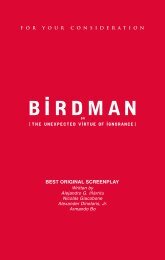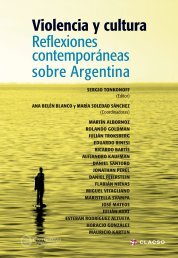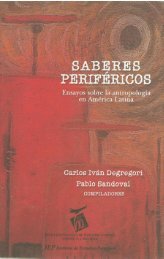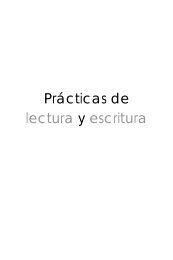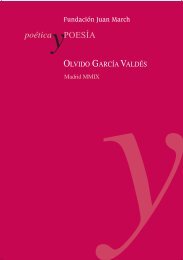blueprints
blueprints
blueprints
Create successful ePaper yourself
Turn your PDF publications into a flip-book with our unique Google optimized e-Paper software.
Tools for Practical Dreaming | 197<br />
Alison Hawthorne Deming, on the other hand, tells us that she was<br />
originally drawn to administrative work through her own powerful sense of<br />
how community had been integral to every important moment of her<br />
growth as a poet. A desire to bring that sense of community to others led<br />
her to work first at the Fine Arts Work Center in Provincetown and second<br />
at the Poetry Center at the University of Arizona.<br />
Dana Gioia came to Poetry Out Loud through the memory of early<br />
experiences with poetry, both at home and in school, that were natural and<br />
embodied, not intellectualized, and a desire to re-create that experience for<br />
young people.<br />
Orlando White, a member of the Toolkit group, remembers how powerfully<br />
the experience of working intensively with poets who visited Santa<br />
Fe’s Institute of American Indian Arts for weeklong residencies influenced<br />
him as a young poet. At Diné College, he now works to create the same<br />
kind of experience for his students.<br />
“Values,” according to Thomas Lux, is “a good and honest word.” Notice<br />
that, in each of these cases, a sense of values, of the importance of a certain<br />
kind of experience, led people to a programming commitment and vision.<br />
So, again, what experience brought you into a passionate relationship with<br />
poetry? Can you imagine replicating that experience where you are?<br />
On the other hand, a passion for your community and a desire to strengthen<br />
that community may make you want to create poetry programming.<br />
Of course, this desire isn’t necessarily separate from a passion for<br />
poetry—in fact, it implies a belief that poetry offers something special to<br />
those who encounter it. Susan Boskoff, a member of the Toolkit group,<br />
directs the Nevada Arts Council and helps rural communities within<br />
Nevada build arts programming. She feels strongly about the power of<br />
poetry “to animate democracy, create dialogue and discourse, and bring<br />
people together through falling in love with the sound of poems.” She<br />
remembers her experience of “falling in love” when she lived in Utah and<br />
was first regularly exposed to poetry readings and the way of speaking that<br />
is unique to poetry, at once public and also personal and intimate. Mark<br />
Strand expressed the same idea in his 1991 introduction to Best American<br />
Poetry 1 when he said about poetry that “[W]e still depend on it in moments<br />
of crisis and during those times when it is important that we know, in so<br />
many words, what we are going through.”



